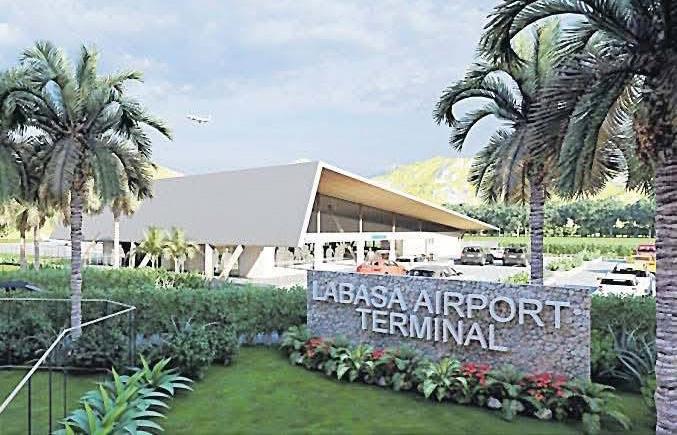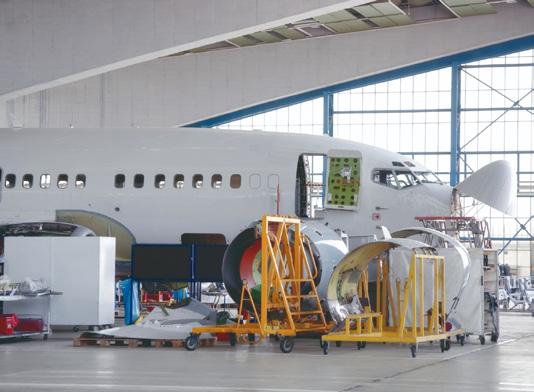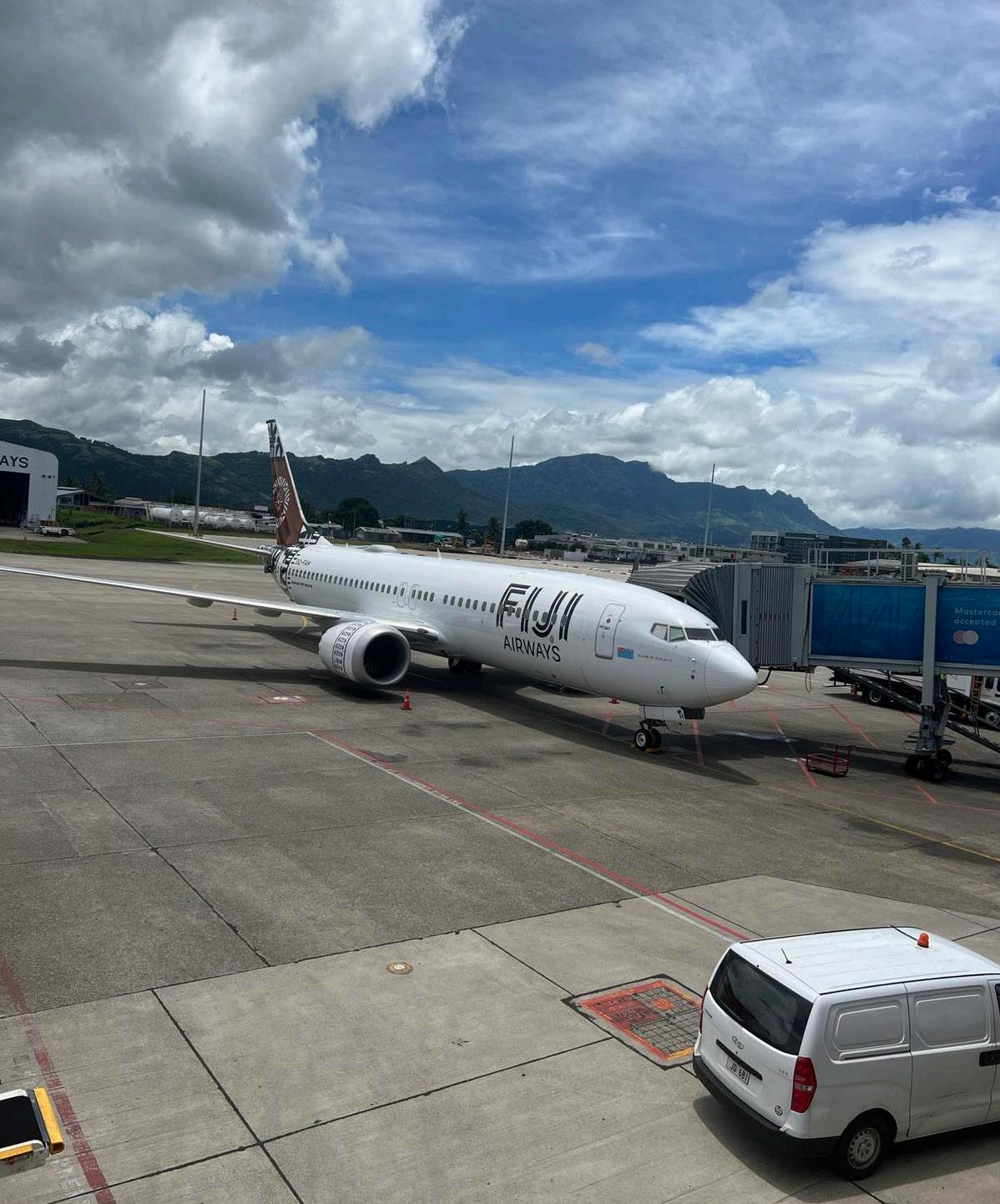








Established in 1999, Fiji Airports is a government-owned enterprise with a reputation for providing first-class aviation services across the country. We catch up with Mesake Nawari, CEO, who reflects on a year of tangible growth for the company and its continued focus on expansion, innovation, and sustainability
Writer: Lily Sawyer | Project Manager: Andrew Lewis

Since Mesake Nawari assumed the role of CEO of Fiji Airports 18 months ago, the company has continued to grow and develop.
A year on from when we last spoke, important capital projects have resumed across the company’s 15 sites, alongside the replacement of ageing assets.
“I’m glad I joined at an exciting and crucial time when changes were needed to further modernise our airports,” Nawari opens.
Fiji Airports’ refreshed perspective for 2025 includes cultivating a new vision, building a dynamic team, developing sustainability, and strengthening diversity and social inclusion.
At the heart of it all, the company’s 25-year Nadi Airport Airside Master Plan (NAAMP), endorsed by the Prime Minister of Fiji, Sitiveni Rabuka, is paving the way forward.
Designed to cater for growing passenger and cargo traffic and
aligned with Fiji Airports’ vision to become a world-class aviation hub, NAAMP is set to cost around USD$1 billion and will be one of the biggest infrastructure projects in the country.
Meanwhile, the company’s new 10-year strategic plan, which runs until 2034, will further support this transformational journey, including developments in infrastructure, digitalisation, financial growth, stakeholder and community engagement, and sustainability.

“We are also in the process of rolling out an accompanying three-year business plan across the company,” he reveals.
Having already ordered six new aerobridges to accommodate wide-body aircraft and commenced construction of the new Labasa Airport terminal building, the business plan is well underway.
“It has taken decades to get to this point, and I’m very grateful to the Board of Directors at Fiji Airports for their support in making this investment happen at a critical time,” Nawari adds.
Having undergone remarkable evolution over the past year, Fiji’s aviation landscape today is stronger than ever.
“Recent developments have reinforced our position as the glue of the industry and a central hub for the Pacific region,” Nawari prides.
The past year was a period of celebration and preparation for Fiji Airports as the company marked its 25th anniversary and laid the foundations for significant growth in the sector, driven by a strong recovery from the COVID-19 pandemic, increased demand for commercial air travel, and infrastructure investment.
Elsewhere, passenger traffic has also seen a robust rebound with a steady increase in international arrivals, particularly from key markets like Australia, New Zealand, and the US, testament to Fiji’s reputation as a premier tourist destination in the Blue Pacific region.
APAC
CAN YOU TELL US ABOUT YOUR ONGOING SUSTAINABILITY FOCUS AND HOW YOU INTEND TO HARNESS
Mesake Nawari, CEO: “Fiji Airports’ sustainability efforts continue to be implemented at Nadi and Nausori International Airports and four of our 13 domestic airports, with plans to extend further.
“In December last year, the Renewable Energy Special Projects team fitted 33 kilowatts of hybrid solar panels on the rooftop of Nadi International Airport’s domestic terminal to power the 14 EVs we acquired last year. Fiji Airports is currently the owner of the largest EV fleet in Fiji.
“Solar panel installations at Labasa, Savusavu, Matei, and Rotuma Airports also form part of this exciting project, and we are in the process of designing our solar photovoltaic (PV) groundmounted solar array.
“We have also enhanced power efficiency by combining the use of direct solar PV energy to charge EVs during the day, with the storage of surplus energy in a battery bank used to power streetlights in the Nadi International Airport car park area and external signage at night.
“Our sustainability investment has also moved onto our residential compound with all streetlights at the Fiji Airports Estate Compound also being converted to solar.”
In addition, improved air connectivity has been afforded by recent upgrades which have played a crucial role in facilitating the growth of tourism.
“One of the highlights of the past year has been the modernisation, planning, and replacement of our ageing assets at Nadi International Airport,” he outlines.
The company has also undertaken projects aimed at enhancing the sustainability of its facilities, including energy-efficient technologies and a waste reduction initiative.
“This aligns with our broader commitment to environmental sustainability and our ambition to lead in green airport practices in the region,” Nawari adds.
Over the past year, Fiji Airports has been working to strengthen its partnerships with existing airlines. This expansion includes direct
flights from new markets with a strong focus on Asia.
“Strengthening our global connectivity ensures Fiji remains a vital gateway for international travellers and enhances business opportunities in both tourism and trade. Nadi International Airport is developing its status as a key transit point,” he shares.
The company is also working closely with airlines to ensure seamless and efficient flight operations, which has further improved on-time performance and operational excellence, contributing to a smoother travel experience.
These enormous infrastructural projects have provided employment opportunities for local people, supporting Fiji Airports’ respect and involvement of the Traditional Owners of the land.
“We are unwavering in our commitment to continue providing employment to Fijians, including


Traditional Owners, also offering them business opportunities at the airport,” Nawari informs.
Focused on continuing to build on the foundations it laid in 2024, Fiji Airports is dedicated to further enhancing the efficiency and sustainability of its operations, expanding its global connectivity, and ensuring it is well-positioned to meet future challenges.
In short, the evolution of Fiji’s aviation landscape over the past year has been marked by resilience, innovation, and a deep commitment to passenger safety, security, and services, whilst focus on stakeholders and communities also remains a priority.
“We are excited about the future and ready to continue our role as a key player in the global aviation network,” he says.
Due to the number of flights, passengers, and related services rising sharply over the past year, Fiji Airports has grown its staff base to more than 500 across Nadi and Nausori International Airports and its 13 domestic airports.
“We needed to fill roles and positions that augur well with the various plans we are launching and teams we are developing,” Nawari details.
Prouds has been a pioneer in duty and fine store shopping and leading shopping in Fiji for the past five numerous world renowned and Free is the oldest running duty the world. Prouds Duty Free stores International Airport Departure, Jewellery Galleria.



duty free, luxury travel retail leading the way in world class five decades. Associated with and local brands, Prouds Duty duty free concessionaire brand in stores operates at Nadi Departure, Arrival Lounges and












Briefly introduce me to Motibhai Group, e.g., a brief overview of your main products and services, locations, client base, and number of employees.
Established in 1931, Motibhai Group is a leading business house with diverse operations, including luxury domestic and travel retail, manufacturing, importation, export, and wholesaling of fast-moving consumer goods. Moreover, the group has a strong presence in print/digital news media, real estate, and service departments, along with quick-service restaurants and regular food and beverage outlets.
Waqavuka Development Company Pte Ltd, a wholly owned subsidiary of Motibhai Group, operates duty-free stores at Nadi International Airport Departure and Arrival lounges trading as Prouds and Jewellery Galleria. Prouds Duty-Free (Prouds) has pioneered duty-free, luxury travel retail, and fine-store shopping, leading the way in world-class shopping in Fiji for the past five decades. Associated with numerous world-renowned and local brands, Prouds is the oldest running duty-free brand in the world.
The company has also extended duty-free operations in Papua New Guinea.
With approximately one thousand five hundred employees, Motibhai Group’s business thrives on purpose, shaped by its unique heritage and entrepreneurial innovation. The group upholds a vision where its past enriches its present and inspires the future with renewed passion and enthusiasm.
What are some ongoing or recent projects people should be aware of?
With the launch of Prouds’ online duty-free shopping in May, we will offer several benefits for travellers, making the shopping experience more convenient, cost-effective, and hassle-free through Prouds Arrivals and Departure stores.
Among the standout successes is the Pure Fiji range, which has firmly established itself as the preferred choice for tourists. Moreover, we have introduced an exciting new range of wines and spirits, including Papa Salt Gin, Awildian Gin, Macallan

Whiskies, and Jameson Triple Triple, and are expanding the confectionery selection with more world-renowned brands like Cavendish Harvey and Whittaker’s. In addition, Fiji’s destination products, including deli, handicrafts, and souvenirs, offer visitors an exciting opportunity to take a piece of the island back home. Moreover, our success can be attributed to the strengthened relationships we have nurtured with all our suppliers, which have paved the way for strategies for mutual growth. This has ensured that we continue to meet and exceed the expectations of our customers.
What, for you, differentiates Motibhai Group from the competition?
Prouds is undoubtedly the South Pacific’s most comprehensive duty-free outlet, offering travellers a unique shopping experience. Be sure to browse at your leisure for the world’s finest names upon arrival and departure.
Over the past year, our company’s travel-retail and downtown operations have experienced good growth and success in several key areas. We have successfully expanded our market presence and launched innovative products, which have all notably enhanced our market footprint, introducing a dynamic range of products catering to diverse consumer needs and preferences.
In the realm of fashion, we have widened our offerings in shoes to include dresses, casual wear, and sportswear, catering to a wide array of lifestyle needs. Additionally, travel and hand luggage segments have also witnessed an exciting expansion in order to cater to the needs of discerning shoppers and modern travellers.
We are passionately associated with Fijian entrepreneurs who come up with unique products. We get involved with them as genuine partners by engaging with planning and production, which also includes customised packaging so visitors to our shores can take something unique from Fiji.
That is what sets us apart from others as we leave a lasting impression and offer a real taste of Fiji to our customers.
Founded in 1984, TFWA is the world’s largest duty-free and travel retail association with a membership of more than 500 companies that supply the global market. Prouds is well represented annually in the Tax-Free World Association (TFWA) Asia Pacific Exhibition and Conference.
Could you tell us about some of the major challenges faced within the industry and the business itself and how these have been overcome?
Duty-free sales are directly tied to international travel, making them highly vulnerable to disruptions caused by economic downturns, geopolitical instability, and global crises such as pandemics. Any decline in passenger traffic directly impacts revenue, requiring businesses to adopt flexible strategies to sustain profitability.
Additionally, regulatory complexities pose a significant challenge. Different countries enforce strict duty-free allowances, taxation policies, and product restrictions, necessitating constant adaptation to compliance requirements. These legal barriers add to operational complexities and can limit product offerings.
Competition is another major factor affecting sales. Domestic and online retailers, along with international duty-free
businesses, offer competitive pricing and convenience, making it harder for Prouds to attract customers. Travellers now have more options to shop outside airports, challenging the traditional duty-free advantage.
Furthermore, high operational costs at Fiji Airports, including rental fees, maintenance expenses, and labour wages, place a financial strain on the business. Balancing profitability while maintaining competitive prices and offering premium products remains a critical challenge.
To stay ahead, Prouds is focusing on innovation, customer service, and exclusive product offerings. Enhancing the passenger shopping experience through personalised services, digital integration, and strategic partnerships with airports has become a key differentiator. By leveraging technology, improving customer engagement, and curating unique travelexclusive products, Prouds is positioning itself as a leader in this dynamic and competitive industry.
In addition, Prouds stores are offering exclusive duty-free discount vouchers on minimum purchases so that customers can enjoy shopping with more savings.
What are your major future ambitions going forward and how will these goals be achieved?
The general travel retail shop is the most used concept at Prouds stores, covering the full range of categories, such as perfumes and cosmetics, wines and spirits, watches and jewellery, fashion and leather, snacks and confectionery, tobacco goods, souvenirs, toys, electronics, and more.
As a global travel retailer, Prouds aims to further improve the overall traveller experience in our shops as we welcome an average of 38 international scheduled flights on a daily basis and initiate growth opportunities that benefit brands, airports, and travellers alike by developing attractive shopping environments.
Looking ahead, our focus remains on driving sustainable growth, fostering innovation, and enhancing customercentricity and experience. We will continue to invest in digital technologies, expand our product offerings, and prioritise sustainability initiatives to meet evolving consumer preferences and market demands. Furthermore, we remain committed to fostering strategic partnerships, including those with our principals and suppliers, embracing agility, and capitalising on emerging trends to ensure long-term success and resilience in an ever-changing landscape.
Could you tell us more about any CSR initiatives that you have in place?
The Motibhai Group has always been at the forefront of community support, especially in times of need. Our strong commitment to corporate social responsibility (CSR) is well reflected in the various community projects that we are involved in, including but not limited to:
• Bushells Fiji’s Biggest Morning Tea Campaign in partnership with the Fiji Cancer Society.
• Association with Foundation for Rural and Integrated Enterprises and Development (FRIENDS) providing support in times of natural disasters and global pandemics.
• Teaming up with the Fiji National Blood Services.
• Oral health promotion, initiatives to improve oral health in the community.

• Burger King has been a proud supporter of the Foundation for the Education of Needy Children in Fiji (FENC) for the past eight years, recognising the vital role education plays in overcoming poverty and empowering communities.
What are you most proud of about Motibhai Group overall?
The Motibhai Group’s ongoing investment and expansion into new areas of the Fijian and regional markets reflects its commitment to the continued growth and development of the booming Fijian economy.
We are most proud of our commitment to excellence, innovation, and the positive impact we have on our customers, employees, and community. Through dedication and resilience, we have built a strong company culture, delivered high-quality products and services, and contributed to meaningful change.
Our success is driven by a passionate team, customer trust, and a vision for continuous growth and sustainability. With a proven track record of excellence, our group has won three coveted awards at the Prime Minister’s International Business Awards 2024. Further reinforcing our commitment to people and professional growth, we have been honoured with the Gold Award for HR Talent Development, among other HR accolades, at the 2024 Fiji Human Resources Institute Awards.
What does the next 12 months look like for Motibhai Group?
In Fiji, we embrace every opportunity that arises within airport environments, and we are always open to the possibility of tendering for new travel-retail outlets. We are currently exploring tenders that come up within the region, with a focus on expanding our footprint in key markets and capitalising on emerging opportunities.
Additionally, we have expansion plans aimed at diversifying our revenue streams and strengthening our position as a market leader in the travel retail industry in the Pacific by also looking at Papua New Guinea (PNG), where we currently have both departure and arrivals stores at Jackson International Airport. We also have tendered for a Prouds Store at another PNG airport.

This includes Fiji Airports’ new Projects Management Unit, which oversees the roll-out of master plans and major projects across all airports.
As part of the team, it now has a Gender Equality, Diversity, and Social Inclusion (GEDSI) Officer and a Planning Monitoring Evaluation Manager – a first for Fiji Airports as it seeks to cultivate equality amongst staff.
“We also have a Sustainability Officer who drives programmes that aim to reduce the carbon footprint across our airport facilities, working closely with our newly formed Renewable Energy Special Projects team.”
In addition, the company’s Airport Bula Champions, nine of which are based at Nadi International Airport, provide a seamless and unique Bula and Fijian experience for those arriving or departing.
Meanwhile, the number of tenants and licensees at the airport has grown significantly, with an increase in airport lounges sponsored by hotel brands transforming the appearance of the arrivals concourse.
“We are also seeing an increase in demand for transport services, with tour companies increasingly applying for office and parking spaces,” he adds.
Waiqele Airport in Labasa is the main gateway to Vanua Levu, Fiji’s second-largest island. The construction of a modern terminal building at the airport is set to enhance air connectivity and economic activity for the company’s Northern Division.
The new terminal aligns with major infrastructure investments currently underway at Labasa Airport and adds to the bustling economy in Northern Fiji, where both business and consumer activity have been on the rise.
For more than 50 years, the existing terminal has faithfully served the people of Northern Fiji. However, due to an onslaught of technological advancements and increasing travel demand, Fiji Airports saw the need to construct a new terminal building to cater for the ever-increasing domestic air travel demand in the region.

In terms of improvements to operational efficiencies, Fiji Airports has constructed new gates, apron areas, and aerobridges in recent months, alongside an upcoming stateof-the-art domestic terminal and upgrades to cargo facilities, baggage handling, and biometric and check-in systems.



BIL was established in 1987 by Fijian Holdings Limited (FHL). It became the parent company of two of FHL’s very first investment acquisitions i.e. Standard Concrete Industries Limited, a rock quarrying and concrete company, and Humes South Seas Limited, a precast concrete manufacturer. Both were pioneer companies in Fiji in their respective fields of business, originally established in the 1950s by companies out of Australia. Over the years Standard Concrete and Humes have become well-known brand names in Fiji for various construction material products like readymix concrete, concrete blocks & pavers, decorative masonry products, quarry aggregates, spun concrete pipes, concrete power poles, precast concrete bridge beams, box culverts, columns & beams, wall panels, flooring systems and various other precast and prestressed concrete products. Standard Concrete and Humes products are widely recognized locally as high-end quality products and have been used on many iconic buildings and landmark public utility structures around the country. Our products are also well known in other Pacific Island countries where we export to.







Air Traffic Management (ATM) system integrates oceanic, terminal area, and tower control capabilities in a single system, providing air traffic controllers with the latest technology including electronic flight strips, advanced flight and surveillance data processing, and training capabilities.
The new technology continues to enhance fuel efficiency by offering direct routing and continuous climb/ descent operations and overall airspace efficiency.
Featuring optimal fuel-efficient routing in the procedural environment with reduced separation minima for airspace efficiency, it gives controllers the tools they need to provide a five nautical mile separation using Automatic Dependent SurveillanceBroadcast (ADS-B)-based surveillance.
“WE ARE EXCITED ABOUT THE FUTURE AND READY TO CONTINUE OUR ROLE AS A KEY PLAYER IN THE GLOBAL AVIATION NETWORK”
– MESAKE NAWARI, CEO, FIJI AIRPORTS
“Fiji Airports operates a single, integrated system for oceanic, en route, approach, and tower control operations that enables it to provide the most efficient service possible to airlines,” Nawari informs us.
“We are proud to be one of the first countries in the world to transition from procedural control to ADS-B without prior radar experience.”
Fiji Airports’ upgrade plans for 2025 are anticipated to significantly enhance the passenger experience and support the growing demand for
Fiji Airports’ 10-year strategic plan redefines its new mission and vision – to be a world-class aviation hub for the Blue Pacific.
Whilst the company can already be considered an aviation hub, it seeks to further enhance its position in the region and is therefore developing various areas to achieve this goal.
In a transformational journey, Fiji Airports will invest in infrastructure and technology for safe and secure aviation, alongside associated services, sharing its experience and expertise with neighbours in the region.
Moreover, it aims to attract and effectively manage exceptional talent, grow shareholder value sustainably, and collaborate and grow with partners.
“We are committed and working together to achieve our goal; teamwork is crucial in this journey,” Nawari asserts.
air travel in the country.
Focusing on several key areas, upgrades include the development of a state-of-the-art transit hotel which will provide guests with more comfortable and convenient accommodation options.
“Located within the airport complex, the hotel will offer travellers a place to rest, refresh, and relax between flights,” Nawari divulges. It will feature modern amenities, high-quality service, and easy access to the terminals, making it a perfect solution for transit and business travellers.
To better cater to both passengers and the local community, the company is also planning to develop retail services and commercial facilities beside the transit hotel, including a range of shops, dining options, and services to elevate the shopping and leisure experience.
“We are also expanding our parking facilities to accommodate the growing number of vehicles,” he adds.
With more flights, passengers, and visitors expected in the coming years, this expansion will ensure travellers can park their vehicles easily and safely, with Fiji Airports set to introduce more spaces for long and short-term parking as well as improved traffic flow infrastructure and accessibility features for
GECI Group is a global leader in technology and engineering solutions for transportation, energy, and infrastructure, both civil and military. With over 40 years of experience across five continents, 60 percent of its operations are international.
GECI provides system integration, aircraft maintenance, and project management — including airport construction and navigation systems.


Phone: +34 956 85 59 57 | Email: geci@geciweb.com Website: www.geciweb.com
passengers with special needs.
It also excels in logistics and supply chain management, delivering customised solutions for aircraft and component operations and maintenance.

Other ongoing works include a new multi-level car park, upgrades to navigation and surveillance systems, improvements to aviation fire and rescue service facilities, the development of the Regional Aviation Academy, and the modernisation of infrastructure at all airports.
“This comprehensive upgrade plan is all about making improvements to meet future demand whilst delivering a world-class experience for both passengers and visitors.”
The projects will also create significant economic benefits, from job creation to increased tourism and business opportunities.
“We’re proud to be part of the continued growth of Fiji as a key hub in the Pacific region, and these upgrades will help solidify our position as a leading international airport destination,” Nawari surmises.

Going forwards, Fiji Airports’ work to upgrade its government-owned airports continues.
For example, the construction of the new Labasa Airport terminal building began earlier this year and is expected to be completed by mid-2026, whilst work on the landside master plan for Nadi and Nausori International Airports has also commenced.
Maintaining safety and security across its facilities likewise remains a top priority for Fiji Airports, and the company has seen significant advancements in this area.
Over the past year, it has focused on upgrading security systems and training personnel to meet evolving global standards.
“We have also ensured that we comply with all international safety protocols to maintain the highest levels of passenger confidence,”
Nawari tells us.
Moreover, Fiji Airports remains committed to supporting its stakeholders and the local communities that its airports serve.
Having strengthened its corporate social responsibility (CSR) initiatives, including supporting local businesses, promoting cultural tourism, and investing in the local workforce through job creation and training programmes, this commitment is notable.
“Our airports serve as a gateway not only for international visitors but also the people of Fiji, and we are dedicated to being a positive force in the communities where we operate,” he passionately concludes.


